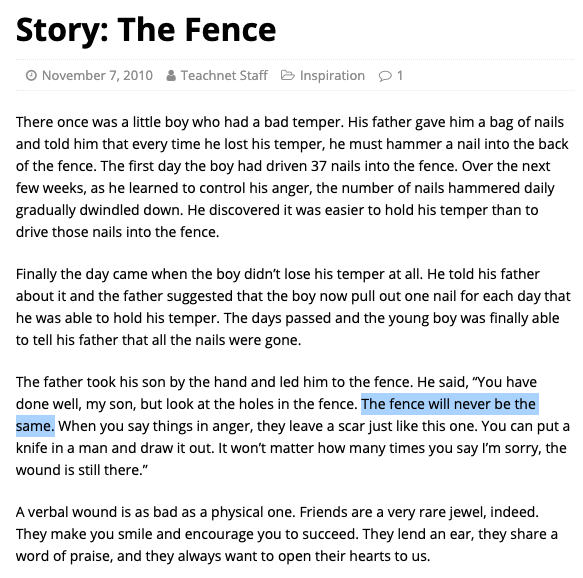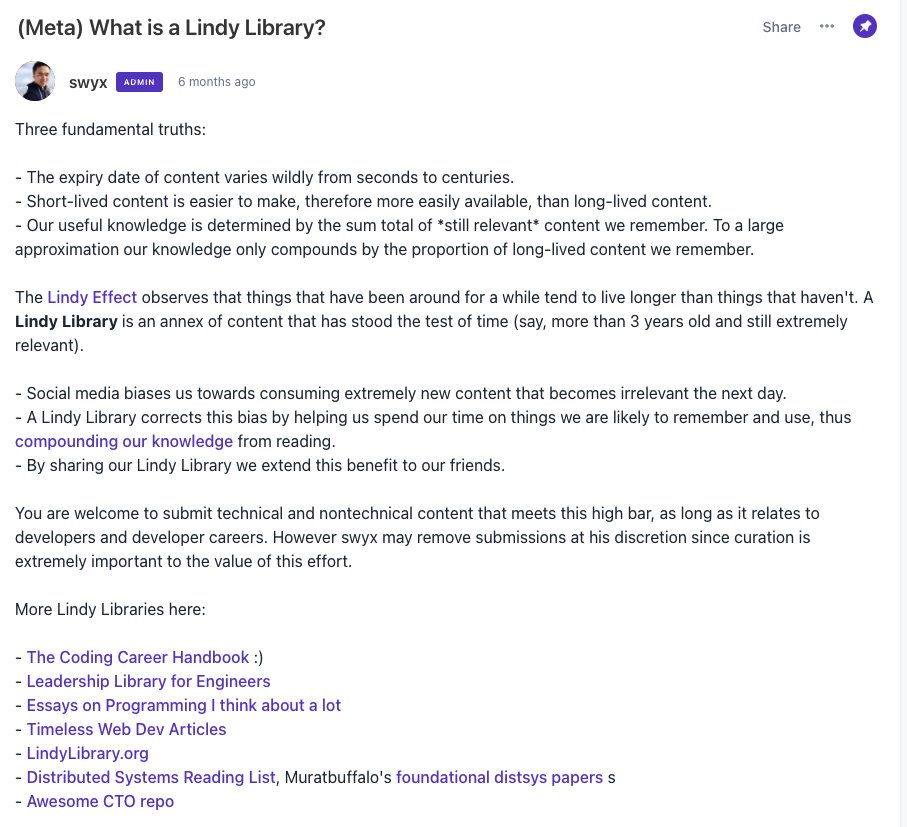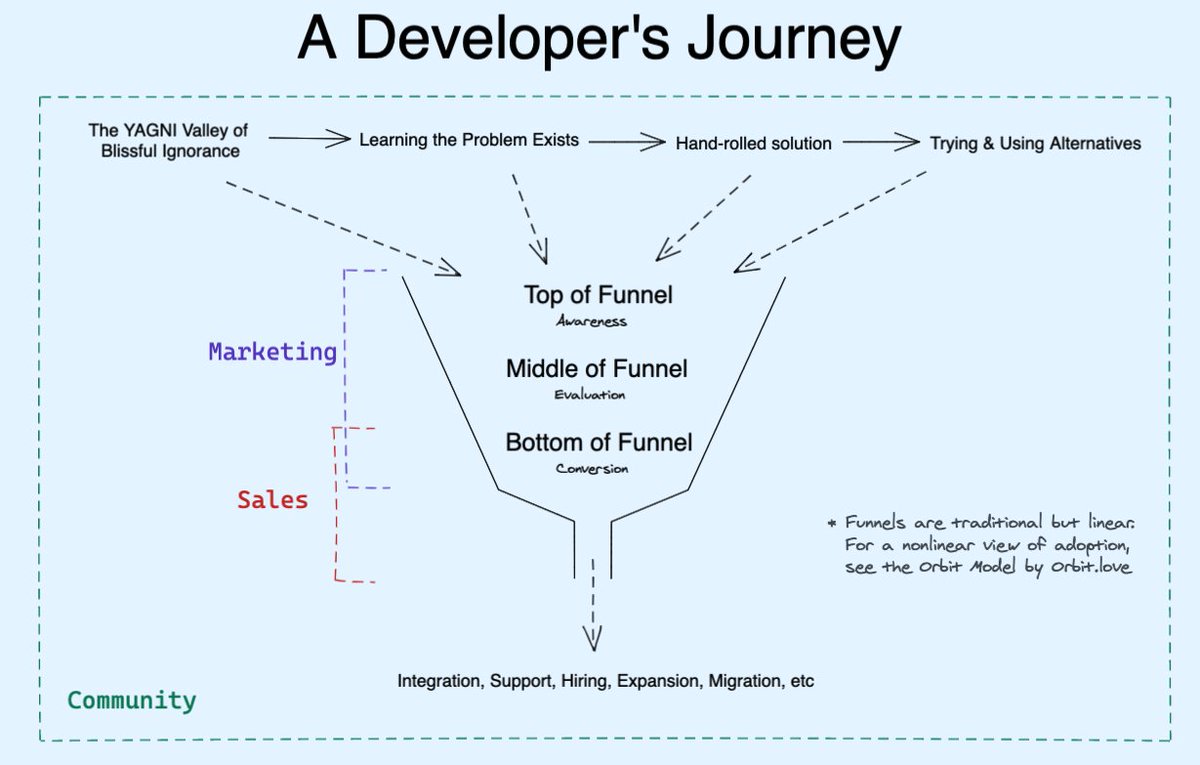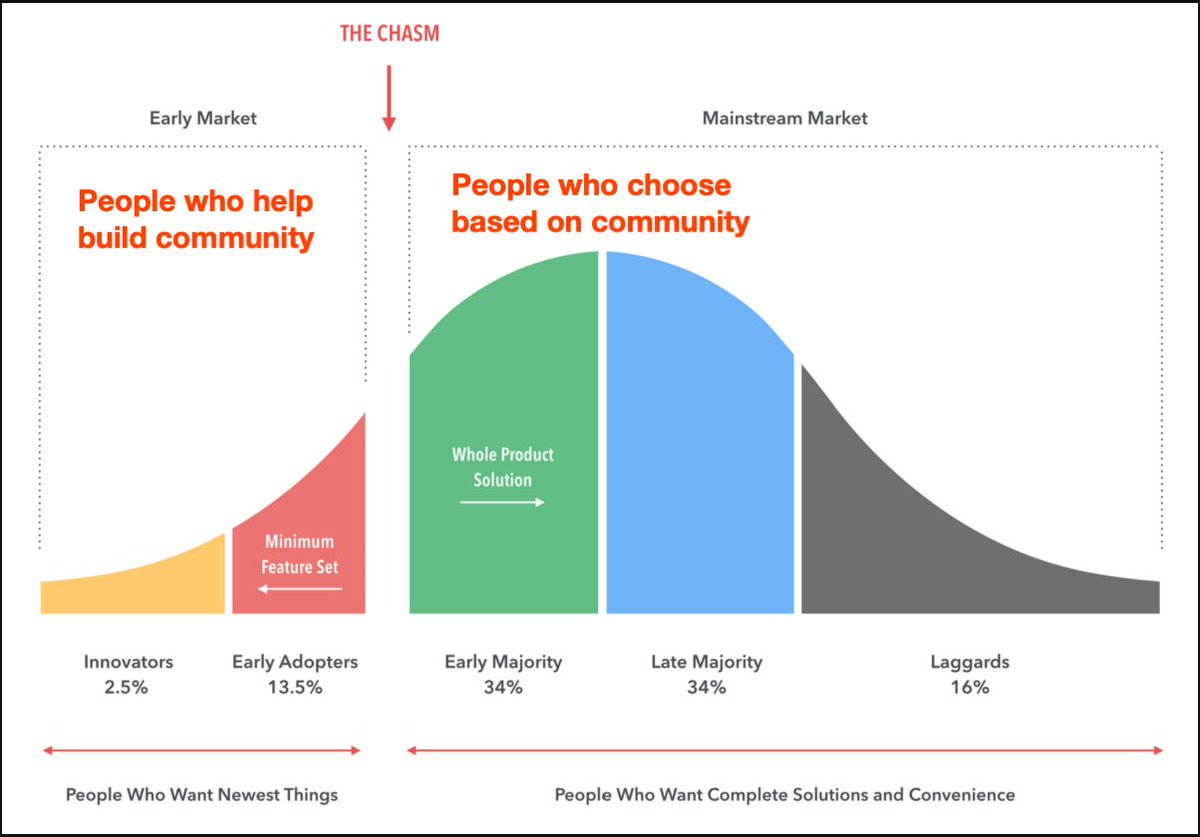
I'm turning 35 today! 🎉
As I grow older, I'm realizing the value of principles to make decisions and guide behavior. What are yours?
Here's 35 of mine:
As I grow older, I'm realizing the value of principles to make decisions and guide behavior. What are yours?
Here's 35 of mine:
This is a thread of 35 Principles from my 35 years, but a full writeup of these will be available on my blog: swyx.io/35-principles/
and discussed on newsletter ✉️ (good reads every week!)
and discussed on newsletter ✉️ (good reads every week!)
1. Life is Too Short for Short Term Games
We only have so many years for long term games to compound. Make 'em count.
We only have so many years for long term games to compound. Make 'em count.
https://twitter.com/swyx/status/1281424520100737025?s=20
2. Writing is Stupendously High Leverage
It helps to organize my thoughts and learning (aka @fortelabs' Building A Second Brain), and enables me to share great ideas even while I sleep (aka it's a Friendcatcher).
It helps to organize my thoughts and learning (aka @fortelabs' Building A Second Brain), and enables me to share great ideas even while I sleep (aka it's a Friendcatcher).
https://twitter.com/swyx/status/1224538408132993026?lang=en
4. Good Enough is Better than Best
In a world of infinite abundance, you can lose yourself constantly chasing the hottest new thing.
Satisfice rather than Maximize.
In a world of infinite abundance, you can lose yourself constantly chasing the hottest new thing.
Satisfice rather than Maximize.
https://twitter.com/swyx/status/1221129594146840577
5. Less is More
Minimalism wins:
- Subtracting is harder than Adding
- Quantity reduces perceived (and often, actual) quality
- Depth and whitespace stand out
(yes I realize the irony of this principle in a list of 35)
Minimalism wins:
- Subtracting is harder than Adding
https://mobile.twitter.com/patrickc/status/1380556517208825856
- Quantity reduces perceived (and often, actual) quality
- Depth and whitespace stand out
(yes I realize the irony of this principle in a list of 35)
6. Create Clarity
Simple Explanations of What, Why, and How are extremely underrated and extremely useful.
This is also a core skill of all leaders.
Simple Explanations of What, Why, and How are extremely underrated and extremely useful.
This is also a core skill of all leaders.
https://twitter.com/Coding_Career/status/1382726094214758400
7. Optimize for Change
Optimizing for anything else tends to make systems MORE fragile, not less.
If you learn only one lesson from Facebook's open source, learn this.
Optimizing for anything else tends to make systems MORE fragile, not less.
If you learn only one lesson from Facebook's open source, learn this.
https://twitter.com/swyx/status/1383516418205835264
8. Seek First To Understand, Then To Be Understood
My personal favorite of the 7 Habits of Highly Effective People. Wish more of Twitter read it.
My personal favorite of the 7 Habits of Highly Effective People. Wish more of Twitter read it.
https://twitter.com/swyx/status/1218246107781832705
9. Praise in Public, Criticize in Private
Everything is •not• awesome, and I hate people that fake positivity. But... I can either help or make them feel bad about it. The former is more effective than the latter.
Exception if you're harming or misleading the vulnerable.
Everything is •not• awesome, and I hate people that fake positivity. But... I can either help or make them feel bad about it. The former is more effective than the latter.
Exception if you're harming or misleading the vulnerable.
10. Build an Empathy Check Habit
Remember the story of The Fence.
I can't ever take back an impulsive response that hurts someone. When I can't check with trusted friends, I need to think before I tweet.
Remember the story of The Fence.
I can't ever take back an impulsive response that hurts someone. When I can't check with trusted friends, I need to think before I tweet.
https://mobile.twitter.com/swyx/status/1344687793851699200

11. People remember how you made them feel, before what you said.
Watch how Bill Gates and Steve Jobs recount their 3 decades of competing with each other.
Watch to the end.
Then try to recall what Bill said.
Watch how Bill Gates and Steve Jobs recount their 3 decades of competing with each other.
Watch to the end.
Then try to recall what Bill said.
13. Complete Truths are Not Welcome
Most people are more interested in:
- being entertained
- sharing outrage
- feeling good about themselves
- or defending their reputation
than debating truth or improving themselves.
Most people are more interested in:
- being entertained
- sharing outrage
- feeling good about themselves
- or defending their reputation
than debating truth or improving themselves.
https://twitter.com/swyx/status/1372968161620811782
14. Organize IRL Events
You can do a LOT to create excitement and connection in a community — simply by organizing dinners, meetups and conferences.
I randomly *decided* to hold a meetup once. This Sunday, @SvelteSociety holds its THIRD global summit.
You can do a LOT to create excitement and connection in a community — simply by organizing dinners, meetups and conferences.
I randomly *decided* to hold a meetup once. This Sunday, @SvelteSociety holds its THIRD global summit.
https://twitter.com/swyx/status/1179261731304022017
15. Don't offer unsolicited help (Make Sure Help Is Wanted Before Offering It)
Men - be especially wary about this when women are talking about their problems.
Often, they just need support, not solutions.
(but sometimes it really is about The Nail)
Men - be especially wary about this when women are talking about their problems.
Often, they just need support, not solutions.
(but sometimes it really is about The Nail)
16. Ask For Help More
People are happy to help and *like you more* when they have helped you.
Don't worry about showing weakness; you are getting something far more valuable in return.
People are happy to help and *like you more* when they have helped you.
Don't worry about showing weakness; you are getting something far more valuable in return.
https://twitter.com/swyx/status/1378020519774019587
17. Log Your Wins
They can help when you are feeling emotionally down, or when writing a brag document (h/t @b0rk: jvns.ca/blog/brag-docu…).
Help others celebrate their wins too.
PS: a "Brag Slack Channel" can serve as an OLTP store of personal wins.
They can help when you are feeling emotionally down, or when writing a brag document (h/t @b0rk: jvns.ca/blog/brag-docu…).
Help others celebrate their wins too.
PS: a "Brag Slack Channel" can serve as an OLTP store of personal wins.
18. Don't End The Week With Nothing (h/t @patio11)
https://twitter.com/swyx/status/1371227946136993792
20. Speak Succinctly!
Trailing sentences and double-barreled questions are hard to understand!
Set the general direction and shut up. If they're off-track, interject.
This is preferable to preempting all conversation paths to show how smart you are 💁♂️
Trailing sentences and double-barreled questions are hard to understand!
Set the general direction and shut up. If they're off-track, interject.
This is preferable to preempting all conversation paths to show how smart you are 💁♂️
21. Optimize for Retention, not Consumption
We are the sum total of still-relevant knowledge we still remember.
Not the total of the volume of content we consume.
codingcareer.circle.so/c/lindy-librar…
We are the sum total of still-relevant knowledge we still remember.
Not the total of the volume of content we consume.
codingcareer.circle.so/c/lindy-librar…

22. Illustrate Your Point
Adding code samples or drawing 2x2's and system diagrams makes your idea much more effective.
A picture IS worth a thousand words!
Adding code samples or drawing 2x2's and system diagrams makes your idea much more effective.
A picture IS worth a thousand words!
https://twitter.com/swyx/status/1249793388037025797?s=20
23. Separate Your Identity from Your Work
You can learn a lot on the Internet for the low, low price of $YourEgo.
(thanks to @kentcdodds for spreading this idea)
kentcdodds.com/chats-with-ken…
You can learn a lot on the Internet for the low, low price of $YourEgo.
(thanks to @kentcdodds for spreading this idea)
kentcdodds.com/chats-with-ken…
25. Collect Questions
Obsess on collecting good answers and you might be precise but irrelevant.
Obsess on collecting good questions and you will be approximately right.
Obsess on collecting good answers and you might be precise but irrelevant.
Obsess on collecting good questions and you will be approximately right.
https://twitter.com/swyx/status/1349271110492196870
26. Systems > Goals.
"You don't rise to the level of your goals.
You fall to the level of your systems."
- @JamesClear
"You don't rise to the level of your goals.
You fall to the level of your systems."
- @JamesClear
27. Play Games You Cannot Win
Our world is full of winnable games - #1 of the day, employee of the month
External motivators destroy our intrinsic drive. Keep your childlike creativity: remove winning, remember how it feels.
Our world is full of winnable games - #1 of the day, employee of the month
https://twitter.com/swyx/status/1284597930398105600
External motivators destroy our intrinsic drive. Keep your childlike creativity: remove winning, remember how it feels.
https://twitter.com/swyx/status/968688836468453376
28. Use Your Calendar as a Todo List
Normal todo lists don't force you to make tradeoffs.
Sequence your work, set limits, and know when to decline or delegate tasks.
When time block planning, eat your frog: Put First Things First.
Normal todo lists don't force you to make tradeoffs.
Sequence your work, set limits, and know when to decline or delegate tasks.
When time block planning, eat your frog: Put First Things First.
https://twitter.com/swyx/status/1364107473724919809
29. Practice Stoicism.
It'll never stay as great as you want, it's never really as bad as you feel.
This, too, shall pass.
It'll never stay as great as you want, it's never really as bad as you feel.
This, too, shall pass.
https://twitter.com/SunshinyDoyle/status/1154743027040174082
30. Have a Productivity Keystone
If you start a day unproductive, you are extremely likely to be unproductive the rest of the day.
Instead, start off with something productive that you do every morning, you reinforce that today is going to be productive.
If you start a day unproductive, you are extremely likely to be unproductive the rest of the day.
Instead, start off with something productive that you do every morning, you reinforce that today is going to be productive.
https://twitter.com/swyx/status/1329103507731795972
31. Incorporate.
Companies pay expenses before taxes.
People pay taxes before expenses.
Companies pay expenses before taxes.
People pay taxes before expenses.
https://twitter.com/swyx/status/1355099275252785153
32. Stay in the Game
Berkshire Hathaway originally had a third partner, Rick Guerin.
He got caught out with margin loans and had to sell out.
Warren and Charlie survived 14 recessions.
Stay in the bloody game.
Berkshire Hathaway originally had a third partner, Rick Guerin.
He got caught out with margin loans and had to sell out.
Warren and Charlie survived 14 recessions.
Stay in the bloody game.
https://twitter.com/swyx/status/1345870288580276225
33. Don't Skimp On Your Equipment
Spending $10's of thousands of dollars of physiotherapy and pain in future can save you a few hundred dollars on your keyboard and monitor today.
Spending $10's of thousands of dollars of physiotherapy and pain in future can save you a few hundred dollars on your keyboard and monitor today.
https://twitter.com/swyx/status/1274054230911803392?lang=en
34. Earn White Collar, Spend Blue Collar
Don't let expenses rise as fast as income - you probably don't need what you're thinking of buying.
Spend part of your white collar income making up for it's downsides - gym, group classes, personal trainer.
Don't let expenses rise as fast as income - you probably don't need what you're thinking of buying.
Spend part of your white collar income making up for it's downsides - gym, group classes, personal trainer.
https://twitter.com/swyx/status/1323550900816764928
35. The Principle Principle — Turn Lessons To Principles
When we have failures or success, we should form principles so we can write them down and learn from/repeat them.
It is the only way for past versions of you to communicate lessons to future you.
When we have failures or success, we should form principles so we can write them down and learn from/repeat them.
It is the only way for past versions of you to communicate lessons to future you.
https://twitter.com/swyx/status/952232991455174656
That's it for now - if you'd like to read this as a blogpost, I've pre-unrolled it for you here 😉
swyx.io/35-principles/
As always, I'm a work in progress. Email signup in there if you want the next 35.
swyx.io/35-principles/
As always, I'm a work in progress. Email signup in there if you want the next 35.
• • •
Missing some Tweet in this thread? You can try to
force a refresh








